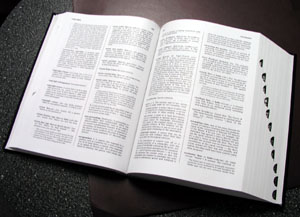
This glossary was created and/or compiled from the participants of the OpenAIRE train-the-trainer bootcamps
Special | A | B | C | D | E | F | G | H | I | J | K | L | M | N | O | P | Q | R | S | T | U | V | W | X | Y | Z | ALL
F |
|---|
FAIR PrinciplesFAIR: Findable, Accessible, Interoperable, Reusable "The FAIR principles were designed with data-driven and machine-assisted open science in mind. The final aim of following FAIR principles is that machines as well as people can Find, Access, Interoperate and thus Reuse each other’s research objects. In the original FAIR paper by Wilkinson et al. (2016) the principles were formulated but (consciously) no details on implementation choices were included. Soon, it appeared that deviations from the intentional meaning of the authors were circulating. Although this was a predictable development, a second paper will be published in which the FAIR principles are revisited, including some of the apparent circulating misperceptions." Reference:What is FAIR ? The Four Basics of FAIR
Reference: OpenAIRE Guides for Researchers: How to make your data FAIR | ||||||||
File formatFile format is a standard way of encoding information so that it can be stored in a computer file. Digital research data may be stored in a wide variety of file formats, depending on the devices and tools used in data collection and processing. File formats may be proprietary (the encoding-scheme is designed and owned by a company or organisation, and is not published, due to which files can be opened only by those who have particular software or hardware tools) and/or prone to obsolescence (legacy formats, bit rot). To ensure that users can access and understand data and that data can be preserved in the long term, it is necessary to use open (defined by an openly published specification that anyone can use) and lossless formats (ensuring that no data or quality loss will occur during file manipulation). Some file formats, though proprietary, have become the de facto
standard due to their ubiquity (e.g. TIFF).
Source: https://www.openaire.eu/how-to-comply-with-horizon-europe-mandate-for-rdm (Glossary) | ||
File naming conventionFile naming convention is a framework for generating file names that
have a consistent structure, while describing the content of files and
their relations to other files. Source: https://www.openaire.eu/how-to-comply-with-horizon-europe-mandate-for-rdm (Glossary) | ||
FORRT"FORRT is a Framework for Open and Reproducible Research Training advancing research transparency, reproducibility, rigor, and ethics through pedagogical reform and meta-scientific research. FORRT provides a pedagogical infrastructure & didactic resources designed to recognize and support the teaching and mentoring of open and reproducible science. FORRT strives to raise awareness of the pedagogical implications of open and reproducible science and its associated challenges (i.e., curricular reform, epistemological uncertainty, methods of education) and advocates for the opening and formal recognition of teaching and mentoring materials to facilitate access, discovery, and learning to those who otherwise would be educationally disenfranchised”. Reference: FORRT Framework for Open and Reproducible Research Training (2022). Available at: https://forrt.org/ | ||
FOSTER Open ScienceFOSTER is a coordination initiative that aims to support different stakeholders, especially young researchers, in adopting open access in the context of the European Research Area (ERA). It is focusing on integrating open access principles and practice in the current research workflow by targeting the young researcher training environment. FOSTER established a European-wide training programme on open access and open data, consolidating training activities at downstream level and reaching diverse disciplinary communities and countries in the ERA. Reference: Faciliate Open Science training for European research | ||
Framework for Open and Reproducible Research Training (FORRT)The Framework for Open and Reproducible Research Training is a community effort that provides a pedagogical infrastructure and open educational resources designed to support the teaching and mentoring of open and reproducible science. FORRT Community seeks to build together with educators a pathway towards the incremental adoption of open scholarship practices into higher education; generate a conversation about the ethics and social impact of a higher-education pedagogy that emphasizes openness, epistemic uncertainty and research credibility and promote a reflection about the perceived importance of different academic activities and advocate for greater recognition of educational resources. Related term: Open and Reproducible Research. Found in: https://forrt.org/ Reference: Framework for Open and Reproducible Research Training (FORRT). (2022). About us. https://forrt.org/about/us/ | |